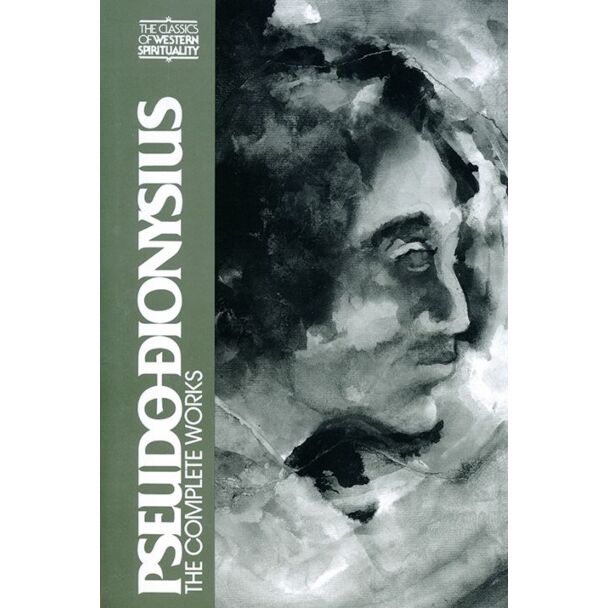Pseudo-Dionysius—The Complete Works
Translation by Colm Luibheid
Foreword, Notes, and Translation Collaboration by Paul Rorem
Preface by Rene Roques
Introductions by Jaroslav Pelikan, Jean Leclercq, and Karlfried Froehlich
Foreword, Notes, and Translation Collaboration by Paul Rorem
Preface by Rene Roques
Introductions by Jaroslav Pelikan, Jean Leclercq, and Karlfried Froehlich
Publication Data: New York, NY/Mahwah, NJ: Paulist Press, 1987
Format: softcover
Number of Pages: x + 318
Dimensions (l × w × h): 22.8 cm × 15.3 cm × 2.1 cm
ISBN: 0‒8091‒2838‒1
Translation by Colm Luibheid
Foreword, Notes, and Translation Collaboration by Paul Rorem
Preface by Rene Roques
Introductions by Jaroslav Pelikan, Jean Leclercq, and Karlfried Froehlich
A volume of The Classics of Western Spirituality: A Library of the Great Spiritual Masters
“The writings attached to the name of Dionysius the Areopagite (Acts 17:34) are all introduced, translated, and annotated in this single volume. [...]The texts themselves are not long, although their dense style has given many that impression. They are here presented in the order suggested by the author’s internal allusions, since there are no dependable historical references. The Divine Names uses the various biblical names for God, such as ‘Good,’ ‘Being,’ and ‘Life,’ as a starting point for a thorough philosophical discussion of the divine attributes. Yet whatever is affirmed about God must also be denied. The Mystical Theology provides an extremely brief summary of the author’s method of affirmative and negative theology and its spiritual goal. It begins with Moses ascending into the dark ‘cloud of unknowing’ and ends with the negation of all presumed attributes of the transcendent God. The Celestial Hierarchy considers the three triads of angelic beings, as described in the scriptures. The Ecclesiastical Hierarchy presents the rites and offices of the church: the three sacraments (baptism, Eucharist, and consecration of the myron-ointment), the three ordinations (of the hierarch or bishop, priests, and deacons), monastic tonsure, and funerals. To describe the relationship of the hierarch to those below him, Dionysius invented the word ‘hierarchy.’ The nine Letters consider different aspects of these same topics.”
—“Foreword by Paul Rorem”
CONTENTS
Foreword
Preface
Abbreviations
Introductions
I. The Odyssey of Dionysian Spirituality
II. Influence and noninfluence of Dionysius in the Western Middle Ages
III. Pseudo-Dionysius and the Reformation of the Sixteenth Century
The Divine Names
The Mystical Theology
The Celestial Hierarchy
The Ecclesiastical Hierarchy
The Letters
Bibliography
Index to Biblical Allusions and Quotations
Index to Foreword, Preface and Introductions
Index to Text
Index of Contemporary Authors in Footnotes
Index of Names and Terms in Footnotes
Format: softcover
Number of Pages: x + 318
Dimensions (l × w × h): 22.8 cm × 15.3 cm × 2.1 cm
ISBN: 0‒8091‒2838‒1
Translation by Colm Luibheid
Foreword, Notes, and Translation Collaboration by Paul Rorem
Preface by Rene Roques
Introductions by Jaroslav Pelikan, Jean Leclercq, and Karlfried Froehlich
A volume of The Classics of Western Spirituality: A Library of the Great Spiritual Masters
“The writings attached to the name of Dionysius the Areopagite (Acts 17:34) are all introduced, translated, and annotated in this single volume. [...]The texts themselves are not long, although their dense style has given many that impression. They are here presented in the order suggested by the author’s internal allusions, since there are no dependable historical references. The Divine Names uses the various biblical names for God, such as ‘Good,’ ‘Being,’ and ‘Life,’ as a starting point for a thorough philosophical discussion of the divine attributes. Yet whatever is affirmed about God must also be denied. The Mystical Theology provides an extremely brief summary of the author’s method of affirmative and negative theology and its spiritual goal. It begins with Moses ascending into the dark ‘cloud of unknowing’ and ends with the negation of all presumed attributes of the transcendent God. The Celestial Hierarchy considers the three triads of angelic beings, as described in the scriptures. The Ecclesiastical Hierarchy presents the rites and offices of the church: the three sacraments (baptism, Eucharist, and consecration of the myron-ointment), the three ordinations (of the hierarch or bishop, priests, and deacons), monastic tonsure, and funerals. To describe the relationship of the hierarch to those below him, Dionysius invented the word ‘hierarchy.’ The nine Letters consider different aspects of these same topics.”
—“Foreword by Paul Rorem”
CONTENTS
Foreword
Preface
Abbreviations
Introductions
I. The Odyssey of Dionysian Spirituality
II. Influence and noninfluence of Dionysius in the Western Middle Ages
III. Pseudo-Dionysius and the Reformation of the Sixteenth Century
The Divine Names
The Mystical Theology
The Celestial Hierarchy
The Ecclesiastical Hierarchy
The Letters
Bibliography
Index to Biblical Allusions and Quotations
Index to Foreword, Preface and Introductions
Index to Text
Index of Contemporary Authors in Footnotes
Index of Names and Terms in Footnotes
Write Your Own Review






